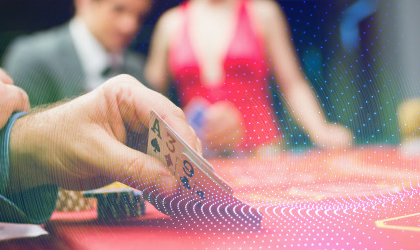What’s Good For One Player May Be Bad For Another

Henry Tamburin 02:47 Aug 23rd, 2006 Blackjack
It may seem strange, but it’s true, that blackjack playing conditions that favor a skilled blackjack card counter are not necessarily the best playing conditions for an average basic strategy player. How can this be? I’ll explain.
Top Blackjack Casinos Online
Average Blackjack Player

Let’s first look at the average blackjack player that knows most, or ideally all, of the basic playing strategy. The latter is the mathematically correct way to play every hand dealt to you and it should be learned before you play because it will significantly reduce the house advantage against you. Notice I said, “reduce”, eliminate, the house edge against you. The fact of the matter is that even though the basic playing strategy is a must-learn first step for anyone that wants to be a skilled player, the casino will still possess a tiny edge over you when you play (about 0.5% in most multi-deck blackjack games). This means the basic strategy player stands to lose 0.5% of each wager made at a blackjack table. That’s fifty cents in expected losses for every $100 worth of bets. Sort of like a hidden tax which you pay the casino every time your wagers total $100. I know it doesn’t seem like much money but most blackjack players make a lot of bets in their lifetime and so their actual loss can amount to a lot of money.
The point is that since all basic strategy players face a negative expectation (that’s the mathematical way of saying that the house has the advantage), the more money that a basic strategy wagers in their lifetime, the more money they stand to lose. Sure, in some playing sessions, basic strategy players will get the cards coming their way and they will be big winners. In others, they’ll wind up with all losing stiff hands. But in the long run when you add the up the amount won and compare it to the amount lost, you’ll wind up in the red. It has to be because the casino has the math working in their favor (remember that hidden tax) and after many playing sessions that tiny house edge will take eventually take its toll on your playing bankroll
Slowing Down You Game

So what’s a basic strategy player supposed to do about all this? Try s-l-o-w-i-n-g down your game. How? For one, play at crowded blackjack tables rather than empty tables. The reason is that if you play at a blackjack table filled with 6 or 7 players you’ll be dealt fewer hands per hour and decrease your exposure to that 0.5% casino advantage. Look at these numbers to see what I mean.
Player plays at a full table and is dealt 60 hands per hour. Assume $10 average bet this means in one hour the player stands to lose $3 due to the house edge ($10 average bet times 60 hands per hour times 0.5% house advantage =$3).
Note that the $3 is an average theoretical loss and most likely the player will win more or lose less than $3 after an hour of play. But over time the math will begin to take its toll and the player will average a loss of $3 per hour due to casino’s small, but real, 0.5% edge.
Let’s suppose instead our basic strategy player opts to play at a less crowded blackjack table with only 1 or 2 other players. Yes, he’s got more elbow room but it comes at a price. With fewer players, the dealer will deal more hands per hour and the game gets faster. Instead of being dealt 60 hands per hour, players will get about 150 hands per hour. Now do the math.
10% average bet times 150 hands per hour times 0.005% = $7.50 average loss per hour. All of a sudden, the $3 per hour theoretical loss zooms to $7.50, or slightly more than double the hourly loss rate. Notice that nothing about the game has changed except the speed.
The bottom line is that it’s more beneficial for basic strategy players that have a negative expectation to play on crowded tables rather than uncrowded tables because it reduces their long-term losses.
Blackjack for a Card Counter
Now, what about a blackjack card counter? Unlike the basic strategy player that faces a negative expectation, the card counter has turned the tables on the casino and has a positive expectation (i.e. the card counter has the advantage over the casinos). In this situation, the card counter stands to earn about 0.5 to 1.0% of every wager made. So card counters will win more the greater number of hands the dealer deals per hour. This is why card counter’s prefer to play solo or with as few players as possible (there are other reasons but this is the main one).
What else can make a blackjack game fast and increase a basic strategy player’s losses? How about those new Continuous Shuffling Machines (CSM’s) that many casinos have implemented on their blackjack tables?
A CSM is an automatic shuffler with this characteristic. After each round (or several rounds) the dealer will place the discards back into the CSM to be randomly reshuffled with the unplayed decks of cards (usually a CSM uses 4 or 5 decks of cards). In other words, the cards go round and round (like playing against an infinite deck of cards) and the dealer never pauses to manually reshuffle the decks. No pause means the dealer can deal more hands per hour. About 20% more on average and that’s not good for the basic strategy player because that means the player’s hourly theoretical loss will increase by 20% (remember that fifty cent tax you play per hand). So the bottom line is that basic strategy players should stay away from playing blackjack on tables that use a CSM.
Speed might be good if you are in a race, but when it comes to playing blackjack speed will kill the average player’s bankroll. So learn to slow down your play and you’ll wind up losing less money in the long run.
On This Page



